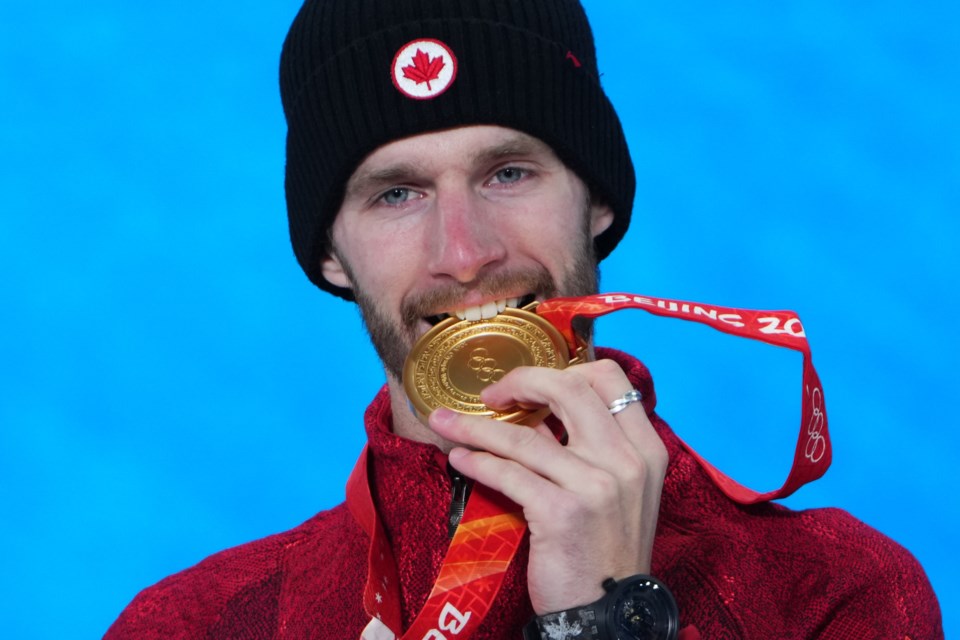BEIJING — Canada was on pace for another sizable medal haul, albeit more bronze than gold, at the halfway mark of the Winter Olympics.
Canada's team in Beijing had earned 13 medals (one gold, four silver, eight bronze) by Saturday. That tied for fourth with Russia behind front-runner Norway (17) and Germany and Austria (14).
The Canadian Olympic Committee's stated gold medal in Beijing is keeping its athletes out of COVID-19 isolation, getting them to the start line and letting the chips fall where they may.
"The goal was to come here, to come here safe and to compete and from there, the athletes will deliver," COC chief sport officer Eric Myles told The Canadian Press.
As of Saturday, none of Canada's 215 athletes had to isolate after their arrival in Beijing.
Figure skater Keegan Messing missed the team event, but landed in time to compete in men's singles. He'd tested positive in Canada and needed to produce the requisite number of negative tests to travel.
Hockey player Emily Clark was pulled from a game because of an inconclusive test result, but she returned to Canada's lineup to play the following day.
Myles believes extra measures and testing the COC implemented before and after departure from Canada, beyond what Beijing required, has kept the virus from dashing Olympic dreams so far.
"Halftime is halftime. There's a lot ahead of us to come," Myles said. "We feel safe, but it would be really a big mistake right now to put our guard down. That's the message and the attitude that we have right now. We don't change anything we've put in place right now."
Canada's chef de mission says athletes have sacrificed too much in the weeks heading into Beijing to be incautious now.
"They've done so much," Catriona Le May Doan said. "They knew their families couldn't be here, but for the last two, three, four weeks before leaving, the fact that they had to all of a sudden say to families, spouse, kids 'I've got to go. I've got to go into isolation because this is what I need to do,' that's pretty incredible."
The stated goal when Canada was host of the 2010 Winter Olympics in Vancouver and Whistler, B.C. was to be the No. 1 country in total medals won.
The host team ranked third with 26, but 14 gold was a record then.
Canada started backing off setting hard medal targets for its Olympic teams, summer and winter, even before the pandemic.
But the reduction, relocation and revamping of competition and training during the two years of the pandemic, plus the variable of who could dodge the virus to actually compete in Beijing, threw medal projections out the window.
Canada's team generated five gold, five silver and five bronze by the midpoint en route to a record 29 medals (11 gold, eight silver, 10 bronze) in Pyeongchang, СŔ¶ĘÓƵ Korea in 2018.
The 2022 edition has work to do in the back half in Beijing to hit that gold standard. All other countries ranked in the top 10 in total medals have claimed at least two gold.
Cancer survivor Maxence Parrot of Bromont, Que., was Canada's lone gold medallist in the first eight days, winning the men's snowboard slopestyle event on Day 3. The 27-year-old will chase a second medal on Tuesday in the big air competition.
Ottawa speedskater Isabelle Weidemann became the country's first multi-medallist in Beijing with silver in the women's 5k and bronze in the 3k.
The International Olympic Committee's introduction of mixed team events in Beijing for gender integration has been a boon to Canada's bottom line, with bronze medals in snowboard cross, aerials and ski jumping.
Relative to some other countries, Canada invests more equitably in men's and women's high-performance sport, Myles said, which makes the country medal-ready for mixed events.
"We need to make sure that we continue to have the opportunities that are equal and we need to make those start at the youth and community level," Le May Doan said.
Snowboarders Meryeta O'Dine of Prince George, B.C., and Eliot Grondin of Sainte-Marie, Que., joined Weidemann in the ranks of multi-medallists Saturday with bronze in mixed team cross.
Grondin also took silver and O'Dine bronze in their individual races.
Canada's first half featured highs, lows and drama. Moguls gold-medal favourite Mikael Kingsbury of Deux-Montagnes, Que., couldn't hide his initial disappointment in silver.
Canadians finished fourth six times in the first half, including world champion speedskater Laurent Dubreuil of LĂ©vis, Que., falling short of the 500-metre podium by three-hundredths of a second Saturday.
Toronto's Jack Crawford was also fourth in men's downhill, but landed on the podium with alpine combined bronze.
John Morris of Canmore, Alta., and Ottawa's Rachel Homan fell short of a mixed doubles semifinal losing in an extra end in their final game of the preliminary round.
"There's some surprises, some disappointment, some celebrations and performance-wise … we're doing well," Le May Doan said. "A lot of just-missed podiums, which is always hard."
Time will tell if Canada gets upgraded from fourth to bronze in figure skating's team event. A doping violation by a Russian starlet quickly became part of the daily media drumbeat in Beijing.
Medals have yet to be awarded, and appeals will likely drag on deep into these Games.
The women's hockey team has dominated the Olympic tournament and outscored its opposition 44-5 heading into Monday's semifinal against Switzerland.
Snowboard, freestyle skiing, bobsled, speedskating and short-track are also fertile medal ground for Canada in the second half, as long as the team's coronavirus defences hold.
"We're not out of the woods," Myles said. "It's going to be the highest focus until we're back home."
This report by The Canadian Press was first published Feb. 12, 2022.
Donna Spencer, The Canadian Press


